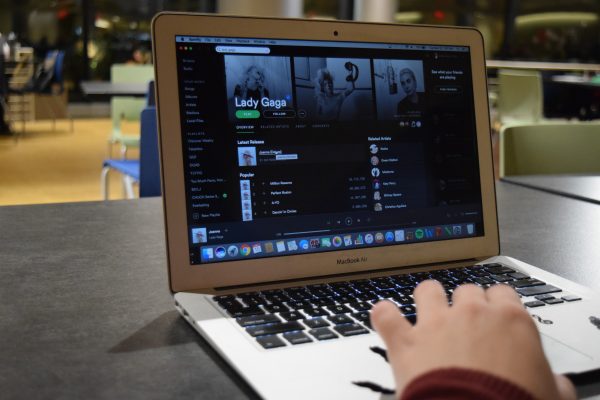Streaming vs. Pay-Per-Song: The Ethical Implications
Streaming music poses an ethical question for music lovers, as they must ask themselves if they feel comfortable with their favorite artists being underpaid. (JESS LUSZCZYK/THE OBSERVER)
November 16, 2016
With the rising popularity of music streaming platforms such as Spotify, Apple Music and Google Play, there are now fewer reasons to purchase songs and albums individually. This is to the dismay of several artists who claim they are being robbed of the total revenue they deserve for their work. Their argument is similar to the following analogy: you do not go into a clothing store and pay an entrance fee to then collect all of the items you want. This is what they feel listeners are doing when they pay a monthly fee to use services like Spotify Premium and Apple Music. They also think it is not fair to other fans who go out and buy their CDs when others just wait to listen to it for free online.
What happens now is that big companies like Apple, YouTube, Vevo, Pandora and Spotify are determining the worth of artists’ music by arbitrarily choosing a set monthly price for their audiences to pay. By doing this, it is the companies, not the artists who profit. Let’s say you add 100 songs to your music library this month. Would you rather pay six to ten dollars for the monthly fee or a dollar per song? It is obviously more enticing to pay less for more, but we do have to acknowledge this may come at the cost of the artists and their collaborators who put the work into making the music.
iTunes by Apple Inc. was notorious for having the early pay-per-song method. Even then, people would typically undercut the transaction of paying for individual songs by illegally downloading music through torrents such as LimeWire. Apple saw this pattern and found a way to bring in those potential customers. They recently followed the streaming trend by launching Apple Music in June 2015. As of September of 2016, Apple has reported over 17 million paid subscribers for their service. Spotify, on the other hand, has approximately 100 million total subscribers, 40 million of whom pay for premium service.
Tidal, a newer streaming company, claims to offer an additional service: better sound quality. Sound quality is usually lost when using other streaming methods. Bought and rebranded by rapper Jay Z almost two years ago, the company takes pride in supposedly paying the most in royalties to artists, songwriters and producers. With a higher subscription fee and exclusive content from multiple artists, many believed this would lead to more music piracy and a lack of continuous customer growth.
In July 2016, the company claimed to have a little over four million paying subscribers. Several artists like Nicki Minaj, Chris Martin and Beyoncé also co-own Tidal, basically making it the first music streaming company to provide music straight from the source to fans, without a middleman providing the service. With this newly promoted pride in giving 75 percent of subscription fees to artists and their respective record labels, it does cost customers an average of $240 per year. Another criticism of Tidal is about who actually earns the profit. The co-owners and artists involved in the company are already internationally-recognized artists. Does the higher fee also help the more obscure, less popular artists?
So with these large companies trying to meet the desires of people wanting to listen to music the easiest and cheapest way, is it morally correct? Should we feel compelled to pay more in order to give artists the money they deserve for their creative and labored efforts in providing quality content? Or do we just look out for ourselves and pay less, seeing as some of these artists already have so much money?
We should consider those smaller artists trying to make it in the music industry. If we choose to use Spotify, we can find relatively unknown artists and listen to their music without actually paying them at all. The more money these artists lose, the less freedom they have to work and create for their fans. It is a choice between what would benefit artists and listeners in the long run and what is currently cheaper and more popular.
It is a vicious cycle these companies are profiting from and with steadily increasing popularity, it is easy to say it will not stop soon. Fiona Whalen, Fordham College at Lincoln Center (FCLC) ’19 believes that “streaming sites should provide monetary support for less well known artists and the more popular artist becomes, the less money they are given by the streaming platform.”
All of these companies significantly profit from this content, yet do not put money back into the production process. For similar platforms like YouTube and Vevo, artists actively pay to have their content published. They are benefitting from the entire transaction of publishing music, audiences seeking it out and actively listening to it.
Shareholders are also making more and more everyday, while the artists who create the actual content you listen to are being left in the dust. Popular artists such as Thom Yorke from Radiohead, Taylor Swift and Will.I.Am have spoken out against this unfair operation, some going as far as to pulling their music entirely from streaming platforms.
Yes, the music streaming business does make content more readily available, allowing people to find more music from different artists and possibly giving some the ability to become more popular. The royalties paid to artists are so low, however, that they cannot solely use that to continue their work, leaving them in desperate need of more revenue. Singer-songwriter Beck said the following in an interview with Pàgina/12 on the matter: “Streaming is inevitable, it’s something that is coming, like it or not. But I question how I can hang on or stay afloat with this model, because what Spotify pays me isn’t enough for me to pay the musicians I work with, or the people producing or mastering my music. The model doesn’t work….”
It would take almost 250 million streams on Spotify to provide an artist with a minimum wage of approximately $15,000 a year. Daft Punk’s popular summer tune “Get Lucky,” reached about 100 million streams, granting each member of the techno-duo about $13,000, which is not a lot when taking into consideration the production costs of making the entire album it was released on. If they relied solely on making money off of Spotify, they easily would not be able to continue funding their projects. “I was not surprised to find that songwriters and producers are paid so meagerly…” Whalen claimed. Think about how popular that one song was, now think about the singles, EPs and albums other artists release that do not reach the same level of fame.
Google Play and Pandora have also been known to back artists into a corner in order to publish their content with a large pay-cut. Members of the band Pink Floyd have also spoken about the hidden 85-percent pay cut they received when tricked into signing a contract with Pandora. Google tries to smuggle in anti-copyright agreements with labels and artists in order to make more off of providing their content to audiences, as well as include their own chosen commercials before most videos and songs.
With more and more artists not being able to afford making and publishing content on streaming platforms, it is definitely possible that the music industry will become more exclusive. Artists not signed to record labels do not always have large amounts of disposable revenue to promote their content and support themselves while they make more. And what about the other genres of music outside the popular techno, pop, rap and R&B groups? Jazz and classical artists are also greatly suffering as their generally unpopular forms of music continue to fall back on streams, even on readily-accessible platforms. If people can literally not afford to quit their day jobs to pursue careers in music, we can soon expect to see a drop of individual and unsigned artists.
With active piracy prevailing, despite the recent popularity of streaming, artists continually struggle to make ends meet and make what they and their fans love—their music. These streaming platforms have made music more accessible and given smaller artists a way to actively share with world audiences, but for people who solely rely on the revenue they receive from their music, we are actively encouraging the undermining of the production and publishing process. We are robbing these individuals of the money they deserve and feeding it right into the pockets of major services like YouTube, Spotify, Pandora and Apple Music. Entering this digital era had music doomed from the start.














Steven Cravis • Nov 17, 2016 at 5:52 pm
I say this honestly as an artist myself. I’m not from any corporation. The streaming paradigm is serving the artists much better than expected. First of all, it became a better (for the artists) option over people just ripping off downloads of music. Second, one real fan of my music listening to my music on one of their playlists repeatedly over time adds up to more than the one time cost and my earning of one album download sale. Every time I release a new album on Spotify, Spotify notifies all my followers, which are more than on my own email list.